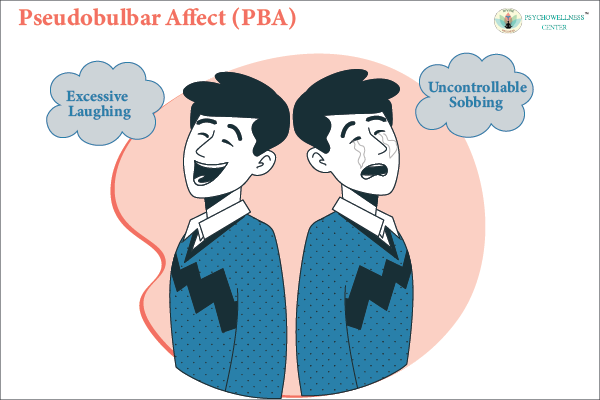A neurological disease called pseudobulbar affect (PBA) causes fits of uncontrollable or inappropriate sobbing or laughter. These incidents don’t line up with your emotional state on the inside. PBA is brought on by a neurological disorder such as amyotrophic lateral sclerosis or a brain injury (ALS).
Even though they may seem appropriate for the triggering event (such as seeing or hearing something humorous or sad), episodes of laughing or sobbing are typically harder to control. They may also linger longer and be more severe than you would anticipate.
PBA also goes by a number of other names, like:
-
Emotional brittleness.
-
Irrational crying and laughing.
-
Disorder of involuntary emotional outpouring.
-
Compulsion to laugh or cry.
-
A lack of emotional control.
PBA may significantly affect your life as well as the lives of your family and carers. It may result in humiliation and worry, which may cause withdrawal and social exclusion.
When attempting to comprehend PBA, it is crucial to understand the distinction between mood and affect. Your own experience of an emotion is your mood. It’s your inner emotions, like despair, rage, or joy. Affect is the outward manifestation of emotion that other people can see, such as a smile, a laugh, or a tear.
The primary sign of pseudo bulbar affect, which is frequently crying or laughing, is affects that don’t match your mood or the severity of your mood.
The crying or laughing can:
-
Be erratic, abrupt, and involuntary.
-
Be excessive compared to the trigger.
-
Occur for no discernible reason.
There may also be uncontrollable outbreaks of rage or irritation.
People with PBA will probably also experience other symptoms that are consistent with the underlying condition because PBA is frequently accompanied by underlying neurological conditions, such as ALS or a brain injury.
The precise cause of pseudobulbar effect is unknown. They speculate that it occurs as a result of damage to the brain’s neurological connections that control how emotions are expressed.
This disruption can be brought on by a number of neurological diseases that are linked to PBA, such as:
-
Traumatic brain injury.
-
Amyotrophic lateral sclerosis (ALS), also known as Lou Gehrig’s disease.
-
Multiple sclerosis (MS).
-
Alzheimer’s disease and other forms of dementia.
-
Stroke.
-
Parkinson’s disease.
-
Brain tumors.
-
Epilepsy.
-
Wilson’s disease.
Pseudobulbar affect (PBA), particularly depression, is frequently misunderstood as a form of mood illness.
When sobbing is the affect you most frequently experience in PBA, this frequently occurs. Depression may also be present in PBA patients, either as a result of PBA itself or owing to other factors. In contrast to depression, PBA, however, causes sobbing outbursts that:
-
Onsets that are more explosive.
-
Shorter in duration.
-
Usually not accompanied by a deep inward sadness.
Despite having a persistently depressed state, people with depression don’t typically experience frequent sobbing fits. If so, they go on for a lot longer than PBA episodes. Additionally, PBA does not exhibit typical depressive symptoms such disturbed sleep or altered eating habits.
Following are some pointers for dealing with PBA and possibly better controlling weeping or laughing fits:
-
Breathe slowly and deeply till the event passes.
-
During an episode, you may be considering or concentrating on something else.
-
Let go of the tension in your face and shoulders.
-
Adjusting your body’s position, if you can.
-
Letting others know about your illness so they are prepared.
-
If PBA is affecting your mental health, you should see an Online counsellor or can search Therapist near me
Speak with your provider about a new treatment plan if you have PBA and your current regimen isn’t working or causing you to experience unpleasant side effects.
Uncontrollable laughter or sobbing can be challenging, embarrassing, and difficult for others to comprehend. Be aware that pseudobulbar affect (PBA) can be treated with medication for which you can search for the Best psychiatrist near me. If you experience PBA symptoms, consult a Counseling psychologist or Best psychologist in India. They are ready to assist you.

